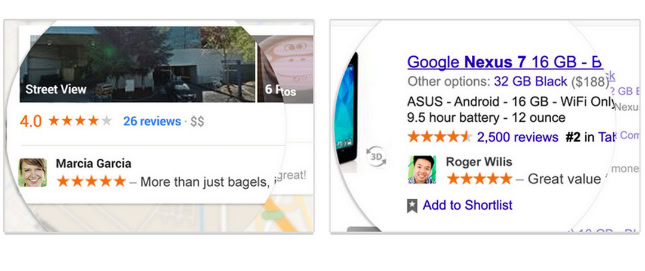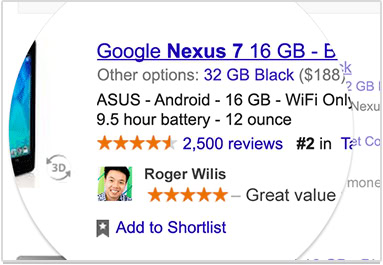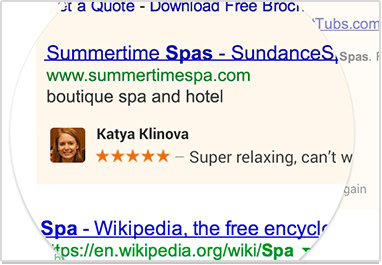Affiliate links on Android Authority may earn us a commission. Learn more.
"Shared Endorsements" or how you can be a star in Google's ads thanks to your Google+ activity

Google on Friday announced an important privacy policy change that will enter into effect on November 11, and whose scope is to allow the Search giant to use more of your data in targeted ads – meet the “Shared Endorsements.”
Simply put, Google will take your profile name and photo, your +1s, your reviews and comments, plaster them next to ads, and serve the combo to your friends and family, Google+ contacts and/or the general public, depending on the settings of your Google+ shares. That’s what Shared Endorsements are, and you can check out a few samples in the screenshots here.
At the end of the day, Google is an advertising business, and everything it does is related to improving its ads and therefore generating more money from them – sure, you may say that Google is involved in a lot of projects, including some great ones that are meant to help the community, but ultimately the company does it all for the ads revenue.
We’ll also point out that it’s the ads cash that pays for all those Google services you may be using free of charge. This doesn’t mean it’s okay for Google to use more personal data in ads, but then again, that’s why it created Google+ in the first place. Not to mention that you can always opt out of using Google services altogether.
Will this new policy hurt you?
No matter what your stance is on this privacy policy update, and on Google’s privacy settings in general – the company has been investigated more than once for privacy-related concerns – you’ll have to know that things aren’t as bad as they may initially sound.

You just have to pay attention to Google’s privacy policy changes heads up and act accordingly – you’ll see them appear in various Google services, as a blue bar hovering on top of the service you’re using, but you also may receive some emails detailing the new policy.
From the get-go, you’ll have to know that Google will not show your profile and any of the information you’re sharing if you chose not to share such data in ads. Also, if you’re under 18 years of age, the setting will be turned off by default. (Here’s where you need to go in Google+ to disable the feature – note that it will be disabled if you already opted out of showing up in ads.)
However, this is only related to ads, and the following paragraph may be of concern, as Google seems to indicate that your endorsements may appear in other places where ads are not present, such as Google Play and “other [unnamed] places:”
When it comes to shared endorsements in ads, you can control the use of your Profile name and photo via the Shared Endorsements setting. If you turn the setting to “off,” your Profile name and photo will not show up on that ad for your favorite bakery or any other ads. This setting only applies to use in ads, and doesn’t change whether your Profile name or photo may be used in other places such as Google Play.
Of course, if you use Google services, but don’t actually use your Google+ page then you’ll have nothing to worry about when dealing with this new policy change.
In case you do choose to let Google show your name, profile image, ratings and reviews in ads, you’ll have to know that Google will respect your sharing choices, and only include Shared Endorsements that apply for certain circles.

If you like a certain product, and you share your +1s, reviews and or comments about that product only with a group of contacts, it’s only that number of contacts that will see your profile picture pop up in ads related to that product alongside data from Google+. That’s assuming the products manufacturer buys ads from Google (see example above).
The privacy changes apply to both individual profiles and to Google+ pages, which means that if you manage Google+ pages, all their social activity will be treated similarly to personal profiles when it comes to Shared Endorsements.
Google is not the first company to revert to such advertising tricks, although the company is taking a different approach than Facebook – the world’s largest social network has its own share of privacy-related programs, as it also uses Like activity inside Facebook for ads that are shown inside the platform.
But Google is apparently taking the appropriate steps to inform users about the changes and ways to opt out of this new ad-related feature.
What are your thoughts on the new Shared Endorsements feature? Are you going to star in Google’s ads, or not?